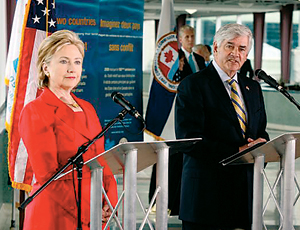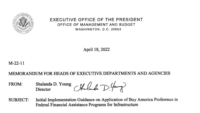Criticism of “Buy American” provisions within the American Recovery and Reinvestment Act is intensifying in the U.S. and Canada. Canadian companies say they’re being hurt, and U.S. business interests worry Canada could impose retaliatory restrictions. The focus is ARRA’s estimated $280 billion, which states and localities administer, including billions of dollars for water and wastewater facilities and other infrastructure projects.

The issue has reached Cabinet levels. At a joint press conference on June 13, Canadian Foreign Affairs Minister Lawrence Cannon said, “People are worried about a rising tide of protectionism developing in the United States...and our government is very concerned, in particular, about the negative impacts of Buy America legislation being felt on Canadian businesses.” Secretary of State Hillary Rodham Clinton responded that the provision “is not being enforced in any way that is inconsistent with our international trade obligations.” But she added she is “well aware of the concerns” over trade matters.
Water and Wastewater Equipment Manufacturers Association President Dawn Kristof Champney says the issue has had “a stifling, if not chilling, effect on the current market,” as localities seek stimulus aid and “try to make sense of the strings that are attached.”
Canadian Manufacturers and Exporters President Jay Myers is concerned about the provision’s impact on industries like water and wastewater, structural steel and alternative-energy technologies. “We’re losing jobs on both sides of the border as a result of these restrictions,” he said. In 2008, U.S. exports to Canada of water and wastewater equipment and pipe were $6.2 billion, Canadian officials say. Imports of such products from Canadian manufacturers were $4 billion.
ARRA requires “all of the iron, steel and manufactured goods” in ARRA construction projects to be “produced in the United States.” It allows exceptions, including a finding for using U.S. products that “would be inconsistent with the public interest.” It also calls for applying the Buy American provision “in a manner consistent with United States obligations under international agreements.”
The U.S. Chamber of Commerce wants the Office of Management and Budget to issue guidance advising localities to interpret ARRA less restrictively.
Canadian provincial and territorial leaders on June 9 endorsed a “reciprocal procurement liberalization agreement” that would “exclude Canada from the negative effects of measures such as Buy American provisions.” The Federation of Canadian Municipalities on June 6 announced it would support localities that ensure infrastructure projects only use materials from countries that don’t impose anti-Canadian sanctions. But the group is holding back for 120 days to let Canada and the U.S. work on a solution. “The clock is ticking,” says Myers.



Post a comment to this article
Report Abusive Comment